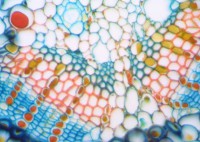
Late in his career, Nobel Prize-winning scientist Linus Pauling became an advocate for the use of vitamin C in treatment and prevention of colds, heart disease and cancer. At the time, his theories were largely debunked by the medical community. Today, Pauling’s ideas are gaining new life as recent cancer research suggests that vitamin C may indeed be effective against cancer cells.
Vitamin C vs. cancer-causing cells
A study published in Science magazine examined the effects of high doses of vitamin C in tumor-afflicted mice. Researchers discovered that the vitamin selectively killed certain mutant cells that are known to cause cancer. The specific mutations, KRAS and BRAF, are found in more than half of human colorectal cancers.
Why did the results of this study vary from the earlier cancer research? According to the authors, vitamin C must be administered intravenously to reach the levels required to kill the mutant cells, while earlier studies focused exclusively on oral ingestion.
“Non-toxic chemo”
The Vitamin C Foundation, which has carried on with Pauling’s advocacy, has dubbed the nutrient the “non-toxic chemo.” Among their publications is a study from 2012 suggesting that long-term use of vitamin C supplements may help prevent breast cancer.
According to Science, the newer study provides evidence for further cancer research involving vitamin C as a treatment for colorectal cancer.
For decades, Issels® has been a leader in the use of integrative, non-toxic immuno-oncology treatments tailored to a patient’s specific needs. If you or a loved one is dealing with a cancer diagnosis, contact us to learn more about our innovative programs.





